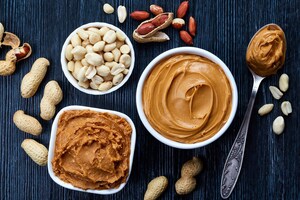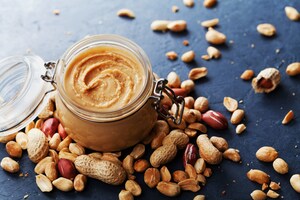Adolescents Who Eat Peanuts Weigh Less and Have Better Diet Quality
WASHINGTON, June 27, 2013 /PRNewswire-USNewswire/ -- A new study in Nutrition Research, "Peanut consumption in adolescents is associated with improved weight status", showed that Mexican-American sixth graders that consumed peanuts at least once per week were less likely to be overweight or obese, had a significantly lower Body Mass Index (zBMI), and had significantly lower total blood cholesterol. In addition, participants who consumed peanuts had significantly higher intakes of vitamin E and magnesium and reported consuming more servings of vegetables than non-peanut eaters. Although there is clear evidence to support the multiple health benefits of consuming peanuts in adults, this study provides strong preliminary evidence that peanuts can have a significant impact on overweight and obesity in youth.
The adolescents in the study are part of a school weight management program, FLOW, conducted at the Children's Nutrition Research Center in Houston, Texas, which is funded by United States Department of Agriculture-Agricultural Research Service (USDA-ARS). Currently 39% of Mexican American children are overweight or obese, compared to 32% of all children in the U.S., and the rates among Mexican American adults is twice as high.
Overweight and obese children are more likely to be more obese in adulthood and develop disease later in life, making them the target of many public health programs. "Low cost and easily implemented interventions such as increasing peanut consumption may be one way to address health risks in at risk populations," said Dr. Craig Johnston, Instructor at the Behavioral Research Center at Baylor College of Medicine, who is overseeing the study.
In the study, peanut eaters had higher intakes of magnesium and vitamin E and trended towards more fiber and potassium intake. Deficiencies are common among Mexican Americans, including lower intakes of magnesium, which may play a role in increasing their risk for heart disease and diabetes. Peanuts are a "good source" of magnesium, vitamin E, and fiber according to the food and drug administration (FDA). They also provide many other vitamins and minerals important for health and reduced risk of disease.
This new research builds on previous work done in the "Family Lifestyle and Overweight" (FLOW) Prevention Program that showed peanut and peanut butter consumption promotes sustainable weight loss in children, reduces hunger, and improves vegetable and nutrient intakes in children.
"These results are consistent with government data from NHANES that shows children who eat a serving of peanuts or peanut butter have significantly lower zBMIs and higher intakes of vitamin E, magnesium, folate, niacin, iron, zinc, potassium, phosphorus, and selenium than non-eaters," said Patricia Kearney, MEd, RD, program director for The Peanut Institute.
Although peanuts and peanut butter are not commonly consumed in Mexican American diets, they have an enjoyable flavor and it has been shown their acceptability crosses over into many cultures. They pair well with almost all flavors and cuisines and can be easily added to sandwiches, soups, and salads, or used as a dip for fruits and vegetables. Peanuts are also an affordable and convenient snack option that can be taken on the go or stored in a backpack.
The Peanut Institute is a non-profit organization that supports nutrition research and develops educational programs to encourage healthful lifestyles. Learn more about this study and about peanuts and health at www.peanut-institute.org
SOURCE The Peanut Institute
WANT YOUR COMPANY'S NEWS FEATURED ON PRNEWSWIRE.COM?
Newsrooms &
Influencers
Digital Media
Outlets
Journalists
Opted In






Share this article